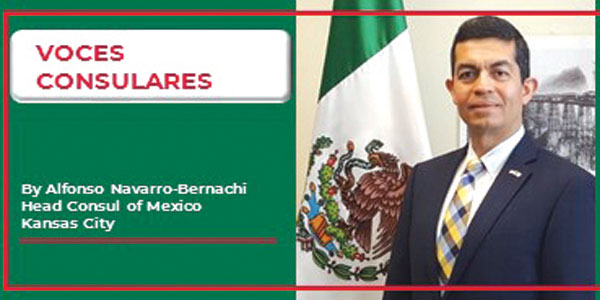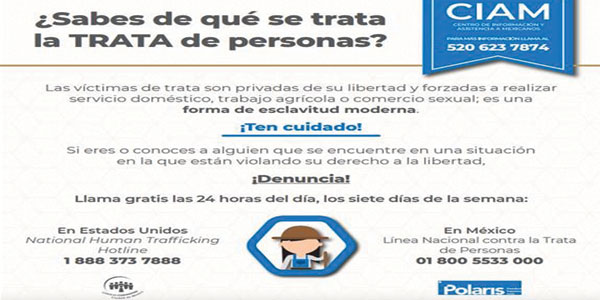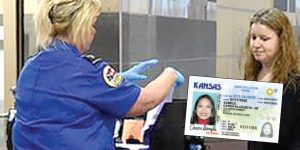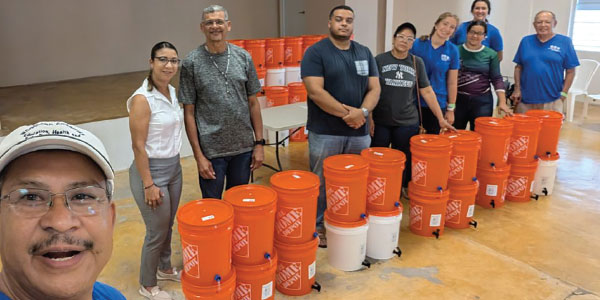
By Alfonso Navarro-Bernachi
Human trafficking is a crime that severely affects the dignity of the victims, depriving them of their freedom and forcing them to perform domestic service, forced labor or sex exploitation. It is a form of modern slavery.
International efforts to counter this crime took shape in 2003, when the United Nations (UN) began to collect information on victims of trafficking and later –in 2013- designating July 30 to commemorate the World Day against Trafficking in Persons.
To date, the UN Office on Drugs and Crime (UNODC) has registered almost a quarter of a million victims of human trafficking worldwide.
The UN estimates that 50 out of every 100 victims of trafficking suffer sexual exploitation and 38 percent forced labor. The female population continues to be the main group affected, as 46 percent of all victims of trafficking are women and 19 percent are girls.
This year, the campaign theme to raise awareness and alert about this serious crime is Blue Heart, which represents the sadness of those who are trafficked while reminding us of the cold-heartedness of those who buy and sell fellow human beings.
Those who commit the crime of trafficking may be closer than we think because their activity begins in the victims’ communities of origin, with false promises by the “middlemen” of getting them work or marriage.
Human smuggling is often confused with human trafficking but they are different: in the first case, the relationship ends when the person reaches their destination after traveling without immigration documents, while in the second, the victims remain captive and suffer exploitation.
The victims may also be close to us and going through one of these situations: working “for free” as payment of a debt or doing it under threats; the traffickers may be controlling the victim’s money and time; they may be retaining the victim’s personal identification documents; they may not be free to go where they want; they are being watched at all times; or they are not allowed to have communication with their family or friends.
If you or someone you know is going through any of these situations, call the Mexican Information and Assistance Center (CIAM) 520-623-7874, any day, any time, or visit your Consulate. Remember: we are a safe zone!
Trata de personas: una forma de esclavitud moderna

La trata de personas es un delito que afecta en forma severa la dignidad de las víctimas, privándoles de la libertad y obligándoles a realizar servicio doméstico, trabajo agrícola o comercio sexual. Es una forma de esclavitud moderna.
Los esfuerzos internacionales para contrarrestar este delito tomaron forma en 2003, cuando la Organización de Naciones Unidas (ONU) comenzó a registrar casos de víctimas y en 2013 estableció la conmemoración del Día Mundial contra la Trata de Personas cada 30 de julio.
A la fecha, la Oficina de Drogas y Delito de la ONU (UNODC) ha registrado casi un cuarto de millón de personas víctimas de trata a nivel mundial.
La ONU estima que 50 de cada 100 víctimas de trata sufren explotación sexual y 38 por ciento trabajo forzado. La población femenina sigue siendo la principal afectada, pues 46 por ciento de todas las víctimas de trata son mujeres y 19 por ciento niñas.
Este año, la campaña de sensibilización y alerta sobre este grave delito es Corazón Azul, para representar la tristeza de quienes son víctimas de trata y recordar al mismo tiempo la frialdad –corazón frío- de quienes compran y comercian con seres humanos.
Quienes cometen el delito de trata pueden estar más cerca de lo que imaginamos porque su actividad comienza en comunidades de origen de las víctimas, con falsas promesas de trabajo o de matrimonio a cargo de “enganchadores”.
El tráfico de personas en situación de migración, llamado comúnmente tráfico de personas, suele confundirse con trata de personas, pero son distintos: en el primer caso la relación concluye cuando la persona llega a su destino luego de transitar sin documentos migratorios, mientras que en el segundo las víctimas siguen cautivas y sufren explotación.
Las víctimas también pueden estar cerca de nosotros y estar pasando por alguna de estas situaciones: trabajar “gratis” como pago de una deuda o hacerlo bajo amenazas; controlan su dinero y su tiempo; retienen sus documentos de identificación personal; no se tiene libertad para ir a donde quiera o no dejan de vigilarle, o no se le permite tener comunicación con su familia o amistades.
Si usted o alguien que conoce está pasando por alguna de estas situaciones llame al Centro de Información y Asistencia a Mexicanos (CIAM) 520-623-7874, cualquier día a cualquier hora, o acérquese a su Consulado. ¡Recuerde: somos zona segura!









